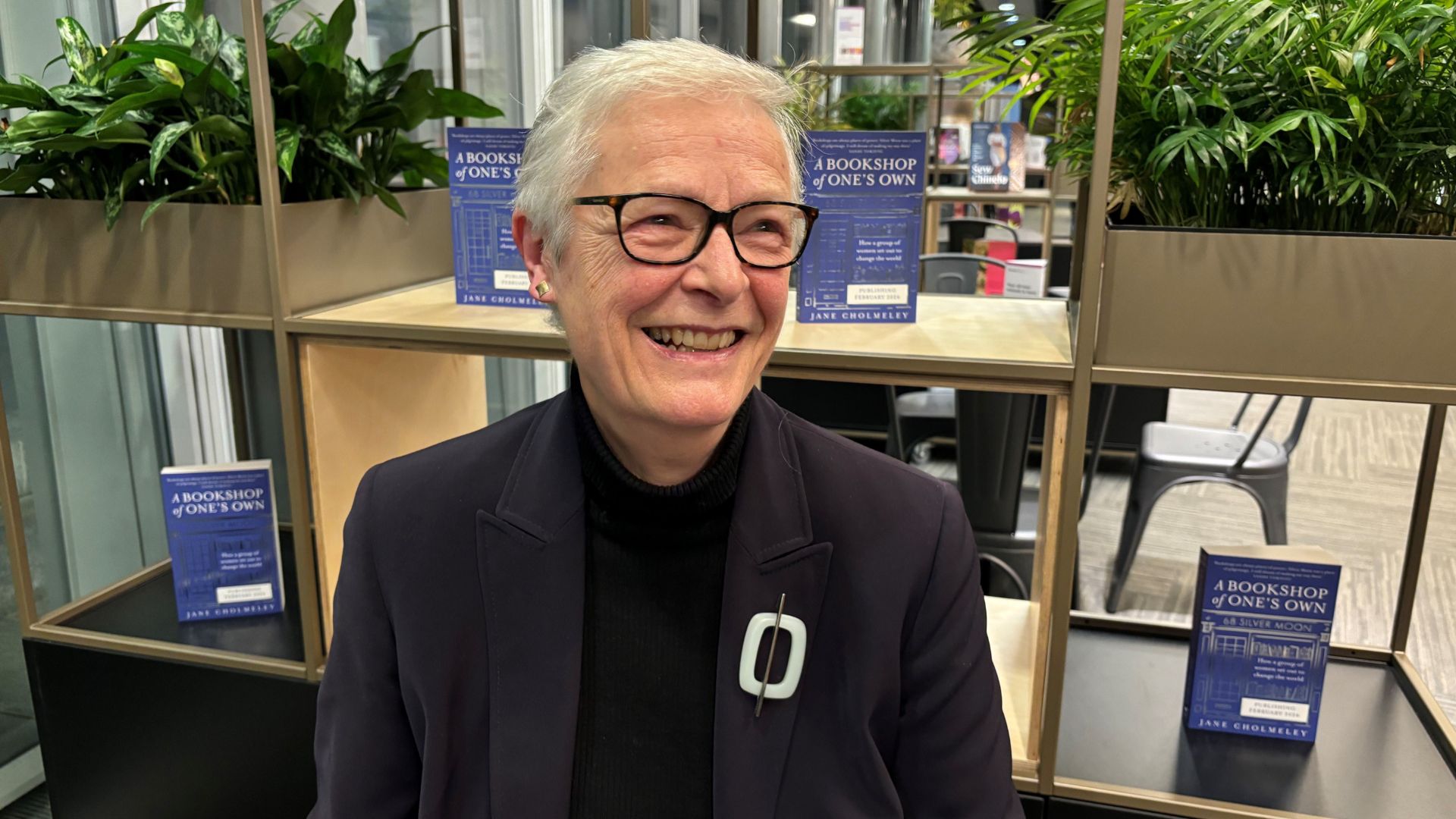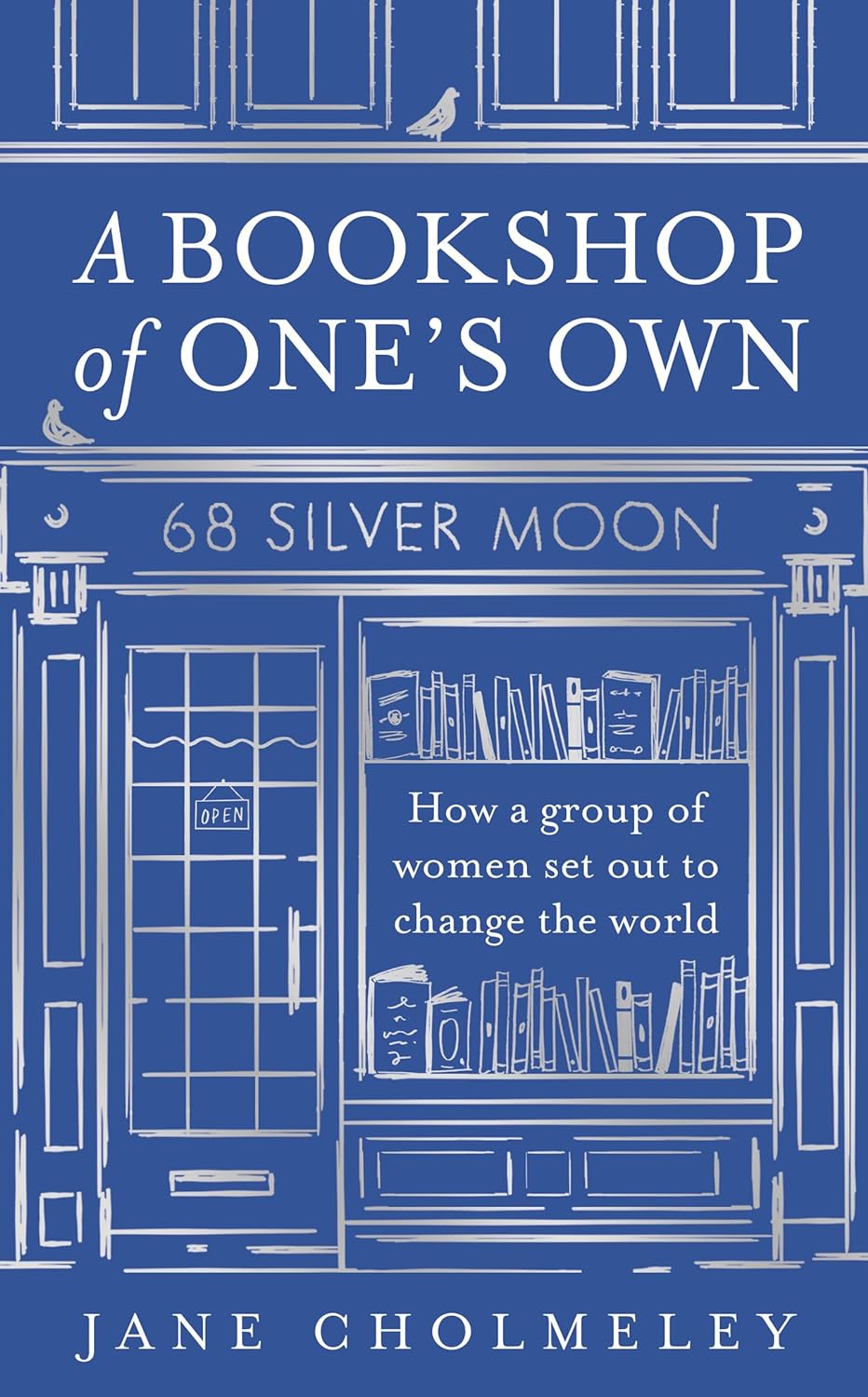You are viewing your 1 free article this month. Login to read more articles.
Jane Cholmeley discusses the history of Silver Moon, the women's bookshop she co-founded
It’s a delight for Jane Cholmeley to finally tell the story of Silver Moon, the successful women’s bookshop she co-founded.
If the pioneers of feminist publishing have been deservedly celebrated, don’t those who pioneered feminist bookselling also deserve their plaudits? Yet the booksellers who championed women’s writing in the 1970s, 1980s and 1990s have been largely unsung: according to Jane Cholmeley, co-founder of the famous Charing Cross Road bookshop Silver Moon, that’s probably because they were “so busy running around trying to make a living, adding up the figures, trying to open on time, and making sure there were enough staff” that they didn’t have time to keep an archive or think about their legacy.
Some of that is set to change with publication next year of A Bookshop of One’s Own: How a Group of Women set out to Change the World, Cholmeley’s impressive account of Silver Moon’s 17 years putting women’s writing front and centre in London’s most famous bookselling street. The book is the story of an adventure, both personal and in business, when Jane and her then partner Sue Butterworth were both made redundant from jobs in publishing, and took a leap of faith to set up the bookshop, together with Jane Anger, in 1984, overcoming numerous severe financial and bureaucratic obstacles along the way—not least after having settled on a dirty, crumbling premises that needed major remedial work before they could even open.
We were fired up by our love for each other and our politics, and going back into employment didn’t seem to be an option. We thought, ‘Oh well, we’ll do it ourselves’
Cholmeley says she’s “shocked” now at the couple’s assumption that having been publishers, they could successfully run a bookshop: “Deskilling a whole profession!” she laments. “But we were fired up by our love for each other and our politics, and going back into employment didn’t seem to be an option. We thought, ‘Oh well, we’ll do it ourselves’. The women’s liberation movement at that time was full of extraordinary energy.”
Cholmeley had been, she says, one of the privileged: white, middle-class, educated. But her discovery of her lesbian identity changed all that. “Suddenly I felt vulnerable. You knew that you’d moved to being a despised minority who some people would consider legitimate to beat up on the street. That was quite shocking. And also very humbling because it gave you the tiniest glimpse of what it was like for other people, be you Black, disabled, poor or whatever.”
Silver Moon was forged as an affirmation of her identity in a hostile world: “It was, how dare you? How dare you treat me badly for who I am?”
Deadly serious project it may have been, but Cholmeley is humorous about it. A Bookshop of One’s Own has many droll stories, often contributed by old staff members, whom she approached to ask for their memories of working in the shop. There’s the time Cholmeley embarrassed herself by asking why the shop was ordering books by men (she’d misinterpreted the name George Eliot); or the time she “got above herself” and called Carmen Callil, whom she’d never met, “a bit of a bitch” to an eager journalist, who then quoted her, commenting: “That’s sisterhood for you”. And there are numerous anecdotes about trade folk—Cholmeley’s now agent James Spackman, for example, was in those days her Bloomsbury sales rep. He yawned his way through one meeting and she challenged him on the rudeness of it; he gently explained he’d been up all night on a Samaritans stint, melting her heart.
Book stock choices were no less controversial in the days of ’70s/’80s feminism: one former staffer recalled that one of her morning tasks had been to retrieve books from down the back of shelves, “where the pro-porn women were hiding Andrea Dworkin’s Pornography: Men Possessing Women and the anti-porn women were hiding Macho Sluts by Pat Califia. The off-our-backs group didn’t like the on-our-backs lot.”
But there’s a serious point there too: “If you are trying to improve the status of 52% of the population, you are bound to have differences of opinion; its like a political party, you have left and right, middle and centre, so you are always going to tread on somebody’s toes. You’ve just got to do your best. You stock all of the books and then let the customer read them and make up her or his own mind.
“I would claim to be a free speech advocate and the role of the bookseller is to make available the points of view, and the role of the customer is to read and make up their own mind.”
You don’t go into business to set yourself up to be attacked but we were regularly attacked.
Life at Silver Moon was often no picnic. Margaret Thatcher’s policies were tearing the country apart, leading to unrest, including over the poll tax and Clause 28. Sometimes bookshops were themselves a target. A Bookshop of One’s Own has a whole chapter, as Cholmeley points out, on violence. “I still find it really hard to remember and to understand the levels of violence, most of it verbal, that we had to accept on a day to day basis,” she says. “You don’t go into business to set yourself up to be attacked but we were regularly attacked. That said, we never suffered the same level of attacks as Collets [a neighbouring bookshop on Charing Cross Road, burned down in the 1980s for stocking Rushdie’s Satanic Verses], or [radical bookshop] News from Nowhere. We were very lucky that we didn’t suffer more than we did, but we shouldn’t have suffered at all.”
But working at the shop was also tremendous fun. Silver Moon pioneered author events, bringing a roll call of some the most famous women authors of the day to Silver Moon: Maya Angelou, Toni Morrison, Margaret Atwood, Jeanette Winterson. There were queues down Charing Cross Road for the talks. It was, she says, “a bloody wonderful way to make a living. OK, it was a modest living. But oh, we had so much fun. When you can go into work one day and say, ‘Oh, I’ll phone up Faber and say can we have P D James please?’ And authors came and it was wonderful. And every day was like Christmas. A parcel arrived and you’d open it up and there would be something interesting in it.
Extract
This is the story of Silver Moon and the women who were there. We must know our own history. Not just for the record, but for vigilance in the future, particularly today, when the battles we fought on issues of women’s safety, abortion, LGBT rights, the banning of books and the suppression of diverse voices have reared up again around the world. At the time we didn’t think of legacy; we were much more concerned with survival and laughter. I want this to be our record. A record of the joy—of seeing favourite authors prosper; the awe—of welcoming a heroine superstar author to the shop; the fun—of thinking up subversive merchandise or rewarding ourselves with outrageously boozy Christmas dinners; the anger—of having to clean the carpet from a wanker’s sperm; the political defiance—as we rainbowed-up the Charing Cross Road and fought Section 28; the daily grind—of learning to run a business; the tensions—around politics, personalities and priorities.
“We got to meet wonderful people, our customers by and large were fabulous, and we felt we were doing something important, not only in terms of getting super books into the customers’ hands, but also in moving the position of women forward. And that’s a great way to get up in the morning and go to work.”











